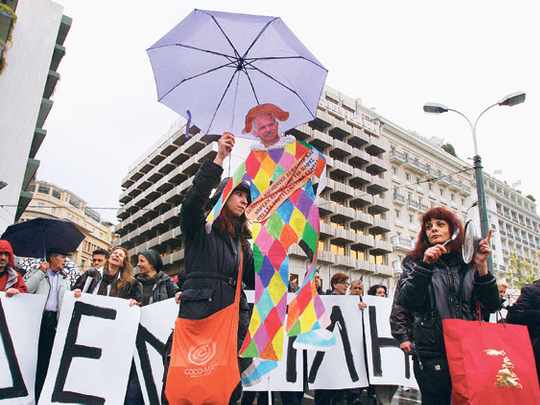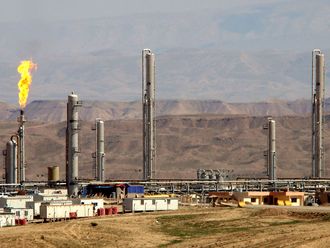
Brussels, Vienna : European Union leaders were expected to lay the foundations for a financial bailout of Greece at a summit in Brussels late yesterday, but any package will demand deep fiscal and economic adjustments by Athens in return.
The aid will draw on the expertise of the European Central Bank (ECB) and the International Monetary Fund (IMF), but will not involve IMF funds, according to an EU government source who said the package was agreed by euro zone finance ministers.
ECB Governor Jean-Claude Trichet will join the EU's 27 leaders to discuss Greece's debt situation.
"The European Commission will design and coordinate the package, drawing on the expertise of the ECB and the IMF," the source said, adding that finance ministers from the 16 countries using the euro were unanimously against IMF financial help.
Political support for such a deal will be discussed by EU heads of state at Thursday's summit, and they are expected to make a strong statement backing Greece, but the details of the support are unlikely to be fin-alised until next week.
Euro zone finance ministers meet in Brussels on Monday and are expected to discuss the bailout then, sources say.
Greek government bond yield spreads over German Bunds narrowed sharply in early trade yesterday as expectations grew of a rescue package. Greek spreads have narrowed from more than 400 basis points to around 260 basis points over Bunds in two weeks as momentum towards a bailout has gathered pace.
Determination
Spanish Prime Minister Jose Luis Zapatero, whose country has also come under pressure for its deficit problems, told reporters on Wednesday that the EU was determined to help Greece, and that finance ministers would work out the details.
One possibility would be for Germany, via a state-owned bank, to buy Greek government bonds, ensuring that its short-term debt requirements are financed, a German member of the European Parliament told Reuters on Wednesday.
Alternatively, direct budget support might be provided via the early release of EU structural funds or some similar mechanism, but it would probably have to be conditional on Greece making deep, IMF-style structural adjustments.
That in turn could provoke further social unrest in Greece, where unemployment is near 20 per cent and unions are threatening mass strikes that could damage the Socialist-led government.
Germany and France are expected to take the lead in any support as Italy and Spain — the other two big economies in the euro zone — are themselves under financial pressure.
French President Nicolas Sarkozy, Germany's Angela Merkel, Greek Prime Minister George Papandreou and Herman Van Rompuy, the EU's new president who is hosting the summit, were due to hold talks before the summit gets underway, an EU source said.
Greece needs psychological and political support from the EU and does not envisage calling on the IMF for help, Papandreou was quoted as saying. He said further speculative attacks in the markets would be a problem for all of Europe.
"If the speculation continues, it is not the business of Greece, but of the euro zone and Europe. It becomes a question of collective will to regulate the speculation," he told Le Monde in an interview.
Germany has avoided speaking openly about offering financial aid for Greece, fearful the promise of support might ease pressure on the government in Athens to enact tough austerity measures needed to bring down its swollen debt and deficit.
Time to act
But fears of contagion to other euro zone members like Portugal and Spain, plunging the currency area into a broader crisis, appear to have convinced Merkel and other EU leaders that it was time to act.
The meeting of the EU's 27 leaders, their economic advisers, the central bank chief and other senior EU officials is being watched intensely by financial markets, with Greece facing the threat of a debt default.
A default would have profound repercussions for the euro single currency used by 16 EU countries, and would put renewed market pressure on the other high debt euro zone members.
France and Germany were expected to hold a joint briefing in Brussels later yesterday, potentially shedding more light on any deal to secure Greece's financial future.
Yesterday's summit, originally called in January to discuss the EU's 2020 growth strategy, has become a litmus test for Greece's stability, with Athens needing to borrow 53 billion euros (Dh267.2 billion) this year to cover its deficit and refinance debts. Without commitment for a deal, pressure will only grow.
Athens' debt pile is expected to grow to more than 290 billion euros this year and the cost of servicing that debt has soared as bond markets have punished Greece for its financial profligacy, pushing yields higher.












